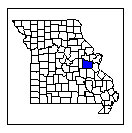Barretts of Catawissa
The Family of Mary Gardiner and Patrick Barrett
Patrick Barrett's Most Marvelous Opportunities
The British Empire of the 1840s was committed to free enterprise. In Ireland that gave land owners the opportunity to export their produce to England, while the tenant farmers who actually grew it were free to use tiny patches of land for... potatoes. For the first 18 years of his life, Patrick Barrett grew strong on potatoes.
So when the blight wiped out the potatoes in August 1846, Patrick, his family, and tens of thousands of other families went hungry. The export of food continued. Hunger turned to starvation. The estate owners were annoyed that their farm workers had gotten so lazy and politicians suggested it was a flaw in the Irish character. So the 18-year-old Patrick Barrett looked on as the families in his village were evicted and their cottages torn down to make way for beef cattle.
But homelessness gave Patrick the opportunity to travel. He and his parents, his three brothers, and his two sisters hit the road, walking. As the weather turned cold and the days grew short, they joined a quarter million other new paupers and worked their way toward Dublin.They sold all their possessions, begged, borrowed and stole whatever it took for a ticket to Liverpool. In February, the Barretts got their chance—top deck of a cargo steamer, a 30-hour ride, with a thousand other refugees on the stormy Irish Sea. They stood shoulder to shoulder in wind and rain, while the pigs and the grain were kept dry below.
In the port of Liverpool, the eight Barretts joined the mass of excess humanity waiting for their ship to come in. High prices for lice-infested lodging, the specter of typhus, and the threat of deportation back to Ireland gave the Barretts the opportunity to think fast and smart. What next?
Opportunity knocked in the form of a sailing ship that had offloaded its cotton and needed ballast for the return trip to New Orleans. In March of 1847, the Barretts and 245 others set sail. If they were especially clever, they scrounged up some straw mattresses to bring aboard so they’d have beds on the nine-week voyage.
When the Barretts arrived on May tenth in New Orleans, they found opportunity galore. Pimps who worked the docks offered the women and girls the opportunity to work in the whorehouses. The men were pointed to ditch digging. The local businessmen owned slaves, of course, but who wanted to sacrifice bought-and-paid-for slaves to the disease-ridden swampland? If Patrick’s cohort of Irishmen dropped dead from yellow fever—well, there would be another boatload coming along soon.
Nobody knows which opportunities the Barretts took advantage of in New Orleans. We do know that when the thread of their story picks up in 1850, the family who stuck together through potato failure, eviction, the long march to Dublin, the docks of Liverpool and the nine weeks in a cargo hold across the Atlantic were together no more.
What happened we have no idea. We do know that Patrick and his father grabbed a chance to get out of New Orleans. Maybe they got jobs on a Mississippi steamboat. In any case, they wound up in that marvelous center of pioneering commerce—St. Louis, Missouri.
In 1850, the census finds Patrick, his father, new wife and infant son a few blocks from the riverfront, sharing an apartment with another family. Unemployed.
While official St. Louis argued the fate of runaway slaves down at the Court House, the Barretts had the opportunity to rise above the hatred aimed at poor, uncouth, Catholic foreigners like themselves. St. Louis nativists worked on voter suppression of immigrant-citizens. It came to a head during the August elections of 1854, as riverfront poll judges were aggressively disqualifying Irish voters. One thing led to another and for two days, nativist mobs tore up Irish homes and businesses in the Barretts’ neighborhood.
It might have been around this time that Patrick’s wife pointed out he was drinking too much. Was this the end of the road for them? Was this what they escaped Ireland for? To work as cheap labor for people who despised them? To raise a family in a sweltering tenement, with too much time for mischief? Maybe it was time to look for a different opportunity. Maybe St. Louis was not “home.”
In the meantime, in the run-up to the Civil War, debate raged about the fate of federal lands in the west. The South wanted the land for its version of free enterprise—slave-dependent plantations. Lincoln and his supporters felt that westward expansion should be an opportunity for the common man.
When the South seceded from the Union, Lincoln seized the opportunity and pushed through the Homestead Act. Starting in 1863, with a small filing fee, five years continuous residence, and certain improvements, anyone could own up to 160 acres free and clear.
When the Missouri Land Office at Boonville began taking applications, Patrick Barrett was number one-hundred-thirteen in line. He staked his claim for 40 acres within the Irish Catholic settlement of Armagh, near the Meramec River about 40 miles west of St. Louis.
Patrick, his wife and children went to work. Homesteading obliged them to build a house, dig a well, plow ten acres, put up fences… and survive to file the paperwork.
In September, 1870, Pat and his neighbor Will Sullens were the first two farmers in Calvey Township to be awarded their “land patents.” With his wife and seven children joining in the celebration, Patrick Barrett became Missouri homestead owner #94.
He applied for a second 40 acres. By 1876, the Missouri census showed the Barretts owned 5 horses, 3 mules, 12 head of cattle, 40 sheep and 58 hogs. Their farm had produced 500 bushels of wheat, 300 bushels of corn, 12 pounds of wool and 3 tons of hay. And by the turn of the century, the Barrett farm had expanded to 324 acres.
***
Opportunities come in many forms. The well-connected grab an opportunity and get wealthy. The dispossessed grab an opportunity and escape to live another day. The rich get richer and the poor get by.
But once in a while a nation takes a gamble on those folks with nothing, those people with no “predictors” of success. The people with too many children. People with the wrong schooling, the funny accents and the cultish religions. Foreigners. The Homestead Act was one of those opportunities.
Patrick Barrett was my great-great-grandpa. His spirit resides in my heart and I can’t help seeing the world through his eyes. As a poor man, he took every opportunity that appeared before him, whether on the docks of Liverpool, the ditches of Louisiana or the riverfront of St. Louis. As a poor man, he must have been tempted to accept that he was worth less than cattle in Mayo, less than pigs on the Irish sea; that on the boat to America, his value could be calculated in comparison to a bale of cotton; that in New Orleans he was worth less than a plantation slave. He was not worth feeding, not worth keeping dry, not worth protecting from disease, and in St. Louis not welcome to vote.
But one more opportunity taken, and there, out on the Missouri frontier, thanks to the Homestead Act, Patrick Barrett finally found dignity, achievement, and belonging. And his experience makes me think twice about what is means to be poor and what it means to offer opportunities.
20 Jun 2012
 NOTES
NOTES
...
